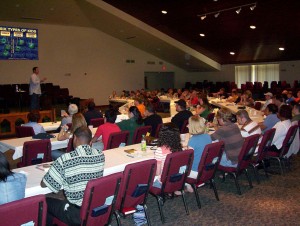I asked the question in yesterday’s blog and heard some great feedback from a bunch of you. “How many minutes will kids actually listen?”
Many of you indicated that you keep talks short. Others incorporate small group time so that young people can process and discuss what they’ve learned. Some of you try to change it up to kill any monotony. Still, some seem to be resisting short teaching time, in fear of “watering down” the message.
I guess that’s really the big dilemma: I want to keep it short enough to be memorable and clear, yet not so short that we lose clarity and depth.
It seems that most of us would agree with seeking “clarity” in our communication. No one would complain if kids walked out with a clear understanding of scriptural truth. The question is, What methodology best accomplishes that goal?
Or let’s think about it in terms that many youth workers can relate to. 23 kids are gathered in the small junior high room in the church basement on a Wednesday evening. Several wiry 6th grade boys roll on the floor wrestling, while a handful of older boys run the foosball table. Across the room a gathering of 8th grade girls whisper and giggle with each other. Adult volunteers are interacting with many of the kids. A few sit alone. Soon, a youth worker announces, “Come on everyone, let’s bring it together.”And after some shuffling and herding, the students are gathered into a small audience facing the front of the room. Announcements, maybe games… but sooner or later, regardless of format, we share a message of truth.
We’ve got a message to communicate, we’ve got a captive audience… how can we communicate that message to young people most effectively?
Is there one answer?
I’ve been thinking a lot about this lately. (Yes, these thoughts are nothing new. This is the reason I wrote the book, 10-Minute Talks. I’ve noticed this glaring need for “clarity” in communication for a while now.) As promised, this week I’m going to blog some of my thoughts about principles that might help ministries communicate better to a generation with a short attention span. Here’re some of the principles I’m going to cover in the next few days:
-USING STORIES
-ONLY USE GIFTED COMMUNICATORS (Click here)
-TALK SHORTER
-USE SMALL GROUP TIME TO TEACH
-USE PROFESSIONAL RESOURCES
I want to start by talking about the power of the story.
THE POWER OF THE STORY
I’ve always loved stories. As a kid I loved bedtime stories. Around the campfire my brother and I loved it when my dad told scary stories. Whenever he would finish, we’d yell, “Another one! Another one!”
When’s the last time someone yelled that when you finished your talk?
Stories are powerful.
I learned the power of a story a little over 15 years ago when I started speaking in the public school. By God’s grace, a campus ministry I was a part of started bringing out a couple hundred kids weekly. These weren’t church kids by any means, and the last thing on their mind was sitting down and listening to a sermon. Most of them were there for basketball, friends and food. But every week I was determined to share some truth with them. So I began ‘cutting my teeth’ at the skill of speaking. (If you ever wanna learn how to communicate to young people, try speaking to 200+ kids that don’t want to be preached to, sitting in school bleachers.) I quickly learned what works and what doesn’t.
Some of the biggest lessons I learned:
1. You’ve got about 30 seconds to grab their attention, then the rest of the time to keep it.
2. Stories work.
3. Humor is a plus.
Fast forward to a few months ago when I stood in front of a few thousand kids in a school auditorium. Guess what three principles I still use? (yep, same three)
I’ve seen a lot of speakers with a lot of gimmicks. I’ve seen speakers that required all kinds of technology, PowerPoint and props. Some of these tools can be very effective. But when I speak, I want one thing: a microphone that works (usually one with a cord- the chances of it working increase greatly). Why? A simple fact: I’ve got stories, and kids love hearing stories.
Using stories is nothing new. Do I even need to bring up Jesus’ use of stories? From what we read in the Gospels, Jesus was a master communicator. Secular philosophers even attest to his effective teaching style. His use of parables not only used stories, but they punched the audience in the gut with convicting truths that they needed to hear. Stories can help us communicate truth with clarity.
To this day, I still use talks that are simply stories with a wrap up.
If you peek at the left hand column of this blog, you’ll see the book I mentioned earlier titled, 10-Minute Talks (you can actually click on the book and read one of the talks in its entirety including the small group questions I provide). This book is a collection of a bunch of talks that I’ve used over the years with great results. Why? They are all stories with one point and one scripture passage. If you read those talks, I think you’ll find that they are simple, clear… and far from watered down.
Don’t underestimate the power of a story.
A few years ago a Youth for Christ group flew me out to speak to a bunch of middle school students at an all night event. When I was introduced, I was staring at an unruly crowd of 1400 middle school students who made two things clear. 1. They were ready for a night of fun. 2. They didn’t want to be sitting in an auditorium listening to me. When they handed me the microphone, a kid in the front row literally said, “Who the Hell are you?” No one else in the room heard, because they were all involved in their own conversations.
I reminded God that I needed him (okay, yes, I reminded me), and then I began telling a story.
“When I was 18-years old, I gave my friend $12,000 dollars. Actually, it didn’t start that way. I had to almost kill him first… but more on that in a minute. It started with me and four of my friends showing up to his house at 6 o’clock in the morning to celebrate his birthday. His mom let us upstairs into his room, and…”
Within 30 seconds, they were hooked.
About 25 minutes later I gave an invitation and over 100 kids came forward and received Christ.
I didn’t have a podium on stage. No PowerPoint. No notes. Here was my outline:
– Greg story
– House on the rock- Matthew 7
– What is your foundation?
– Invitation
Yes, you better believe I worked hard on nailing those transitions between each of those points. But the fact remains, that talk was simply one story, one scripture, communicating one simple point.
Don’t underestimate the power of a story.
Let’s hear from you! Comment: How have stories helped you communicate? Have you ever tried using just one story, one scripture, communicating one clear point? How do stories help communicate with clarity, without sacrificing depth?
 I’m writing this post from a Chicago hotel room. That’s not good, because I’m supposed to be home right now.
I’m writing this post from a Chicago hotel room. That’s not good, because I’m supposed to be home right now.


 Follow
Follow

 Our web site has a ton of these that are readymade for youth leaders. Jump on
Our web site has a ton of these that are readymade for youth leaders. Jump on 
 Only Use Gifted Communicators:
Only Use Gifted Communicators: Why talk for 25 minutes when you can say it in 5?
Why talk for 25 minutes when you can say it in 5?